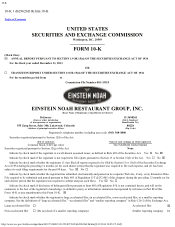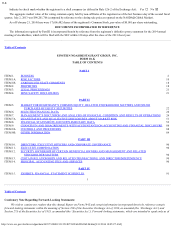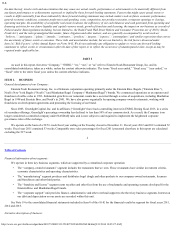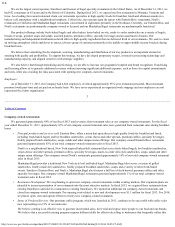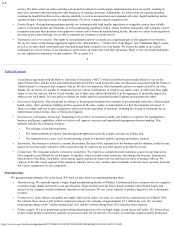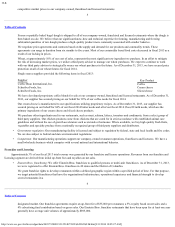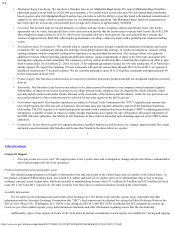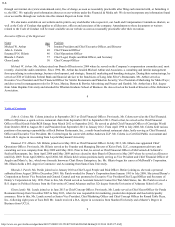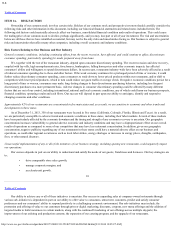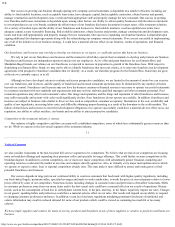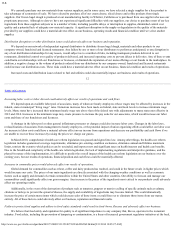Einstein Bros 2013 Annual Report Download - page 9
Download and view the complete annual report
Please find page 9 of the 2013 Einstein Bros annual report below. You can navigate through the pages in the report by either clicking on the pages listed below, or by using the keyword search tool below to find specific information within the annual report.
10-K
http://www.sec.gov/Archives/edgar/data/949373/000119312514073832/d629623d10k.htm[9/11/2014 10:05:27 AM]
Table of Contents
ITEM 1A. RISK FACTORS
Ownership of our common stock involves certain risks. Holders of our common stock and prospective investors should carefully consider the
following risks and other information in this document, including our historical financial statements and related notes included herein. The
following risk factors could materially adversely affect our business, consolidated financial condition and results of operations. This could cause
the trading price of our common stock to decline, perhaps significantly, and you may lose part or all of your investment. The risk and uncertainties
below are all those that we have identified as material, but may not be the only risks and uncertainties facing us. Our business is subject to general
risks and uncertainties that affect many other companies, including overall economic and industry conditions.
Risk Factors Relating to Our Business and Our Industry
General economic conditions, including continuing effects from the recent recession, have affected, and could continue to affect, discretionary
consumer spending, particularly spending for meals prepared away from home.
We, together with the rest of the restaurant industry, depend upon consumer discretionary spending. The recent recession and slow recovery,
coupled with lay-offs, high unemployment rates, foreclosures, bankruptcies, falling home prices and other economic impacts, has affected
consumers’ ability and willingness to spend discretionary dollars. In recent years, restaurants industry-wide have been adversely affected as a result
of reduced consumer spending due to these and other factors. If the weak economy continues for a prolonged period of time or worsens, it could
further reduce discretionary consumer spending, cause consumers to trade down to lower priced products within our restaurants, and/or shift to
competitors with lower priced products, which in turn could reduce our guest traffic or average check. If negative economic conditions persist for a
long period of time or worsen, consumers may make long-lasting changes to their discretionary purchasing behavior, including less frequent
discretionary purchases on a more permanent basis. Adverse changes in consumer discretionary spending could be affected by many different
factors that are out of our control, including international, national and local economic conditions, any of which could harm our business prospects,
financial condition, operating results and cash flows. Our success will depend in part upon our ability to anticipate, identify and respond to
changing economic and other conditions.
Approximately 42% of our restaurants are concentrated in five main states and, as a result, we are sensitive to economic and other trends and
developments in these states.
As of December 31, 2013, 358 of our restaurants were located in five states (California, Colorado, Florida, Illinois and Texas). As a result,
we are particularly susceptible to adverse trends and economic conditions in these states, including their labor markets. Several of these markets
have been particularly affected by the economic downturn and the timing and strength of any economic recovery is uncertain. Our geographic
concentration increases vulnerability to general adverse economic and industry conditions and may have a disproportionate effect on our overall
results of operations as compared to some of our competitors that may have less restaurant concentration. In addition, given our geographic
concentration, negative publicity regarding any of our restaurants in these states could have a material adverse effect on our business and
operations, as could other regional occurrences such as local labor strikes, energy shortages or increases in energy prices, droughts, earthquakes,
fires, or other natural disasters.
Unsuccessful implementation of any or all of the initiatives of our business strategy, including opening new restaurants, could negatively impact
our operations.
Our success depends in part on our ability to understand and satisfy the needs of our guests, franchisees and licensees. Our key strategies are
to:
• drive comparable store sales growth;
• manage corporate margins; and
• accelerate unit growth.
10
Table of Contents
Our ability to achieve any or all of these initiatives is uncertain. Our success in expanding sales at company-owned restaurants through
various sub-initiatives is dependent in part on our ability to offer value to consumers, attract new customers, predict and satisfy consumer
preferences and our consumers’ ability to respond positively in a challenging economic environment. Our sub-initiatives may include: the
promotion and offering of value to our customers through print or digital marketing, discounts, coupons, new menu offerings and the addition of
targeted media to build awareness in certain markets, along with the continued broadening of our offerings across multiple dayparts; the
improvement of our ordering and production systems; the expansion of our catering program; and the upgrade of our restaurants.

